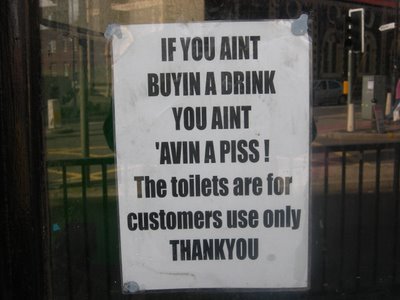Just perfect

I'm just back from a few wet-but-enjoyable days in Devon, and I thought I'd share one of my holiday snaps with you. Because, in its unpretentious way, the sign you see here is a perfect piece of persuasive writing.
By which I mean there's not a single word we could change or add that would increase the effectiveness of the communication, however hard we might try:
Caution, wet paint!
Wet paint - DO NOT TOUCH!
WATCH OUT! THIS PAINT MAY STILL BE WET.
Beware: wet paint. Possibility of damage to clothing.
Passers-by are strongly advised to avoid inadvertent contact with wet paintwork in the immediate vicinity of this notice.
See? And there's another more specific way in which this sign demonstrates the principles of good persuasive writing. It doesn't tell us what to do or think. Instead, it provides us with a piece of valuable information, and leaves us to supply the appropriate response.
Oh yes, and thanks for pointing out that reading this blog is now, indisputably, as interesting as watching paint dry.
Two little letters that guarantee I won't read on
I'll read anything. No, really, I will. If I'm having breakfast, and there's nothing else to hand, I'll study the ingredients on the back of the cereal packet. But one thing I never read is anything headed with the letters MP. If it's by a serving (or recently retired) politician, I'm just not interested.
The obvious explanation is that I don't enjoy being lied to, but actually, there's a bit more to it than that. I could probably put up with bare-faced untruths; but what I can't stand is the crushing sense of predictability when politicians hold forth. Before you've read a word, you know precisely what they are going to say. Whatever the issue they are writing about, they know the party line, and the chances of their deviating from it are roughly comparable to those of Wayne Rooney announcing his intention to leave Manchester United, in order to study Renaissance Art at the Courtauld Institute.
Writing which holds no possibility of surprising or enlightening us gives us no reason whatever to read on. Not even those of us who are hopelessly addicted to the written word.
Joke
I heard this today, and it made me laugh. And I'm including it here on the just-about-defensible grounds that good writers take pleasure in words, and the funny things they get up to . . .
Man walks into an Indian restaurant. Orders chicken tarka. Waiter mystified. Man explains, it's like chicken tikka . . . but 'otter.
No? OK, I'll make sure the next post is stony-faced serious.
Pubs get persuasive . . .

When I first started going to pubs, several hundred years ago, they gave very little away. As far as I can remember, the only information available to potential customers about what they could expect inside was basic in the extreme: a fine selection of quality ales; food served from 12 - 2.30 pm; that kind of thing.
But recently, publicans have got a lot more street-wise; and outside virtually every pub in town there's a blackboard or two telling you, at the very least, what's on the menu today and which major sports event you can enjoy on the giant plasma screen TV.
And I'm interested to note that now it's gone one step further, with pubs like the one just down the road from me experimenting with pure "brand advertising": communications with potential customers that provide no factual information, but attempt instead to convey a flavour of the boozer's distinctive character. (A place, in this case, where drinkers can expect to be assailed with whimsical trivia by the cheery bar-staff, apparently.)
I'm not crazy about this particular example, which seems a little too "we're all mad here, we are" to me. But I certainly find it more appealing than the sign below, which appears in the window of another pub close to where I live; one where I certainly won't be lifting a noggin and sharing a joke with my jovial host any time soon.

Apostrophes that matter and apostrophes that dont

I'm always saying that, for persuasive writers, what's "correct" depends quite a bit on context: who is communicating with whom, and where and when the communication is taking place. And here's a good example.
I'm not too concerned about the missing apostrophe above, which appears outside the vet's surgery round the corner from where I live. (As long as he can put a geriatric hamster out of its misery, that's good enough for me.) The one below, on the other hand, bothers me quite a bit: the staff car park in question is at my daughter's school.

 I'm just back from a few wet-but-enjoyable days in Devon, and I thought I'd share one of my holiday snaps with you. Because, in its unpretentious way, the sign you see here is a perfect piece of persuasive writing.
I'm just back from a few wet-but-enjoyable days in Devon, and I thought I'd share one of my holiday snaps with you. Because, in its unpretentious way, the sign you see here is a perfect piece of persuasive writing. 







